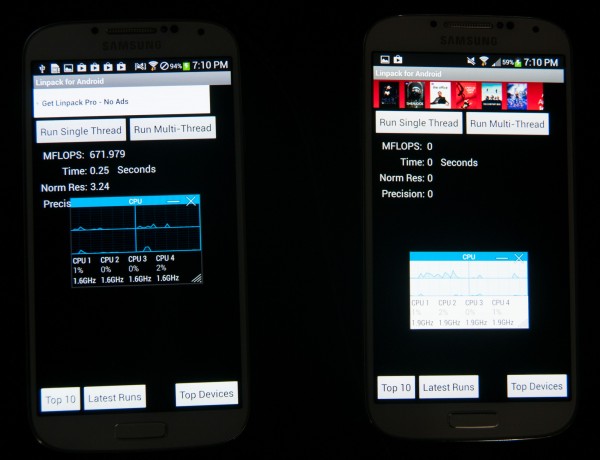 You may have read earlier today that AnandTech uncovered some unusual behaviour found on the Samsung Galaxy S4 which suggested that the device was able to vary its processor speed when a benchmark app was running. The findings reported that an app called TwDVFSApp.apk was able to control both CPU and GPU voltage and frequency, essentially overclocking the performance of the Galaxy S4 temporarily. It all sounded a bit dodgy, but Samsung has responded on its Samsung Tomorrow blog with a statement:
You may have read earlier today that AnandTech uncovered some unusual behaviour found on the Samsung Galaxy S4 which suggested that the device was able to vary its processor speed when a benchmark app was running. The findings reported that an app called TwDVFSApp.apk was able to control both CPU and GPU voltage and frequency, essentially overclocking the performance of the Galaxy S4 temporarily. It all sounded a bit dodgy, but Samsung has responded on its Samsung Tomorrow blog with a statement:
Under ordinary conditions, the GALAXY S4 has been designed to allow a maximum GPU frequency of 533MHz. However, the maximum GPU frequency is lowered to 480MHz for certain gaming apps that may cause an overload, when they are used for a prolonged period of time in full-screen mode. Meanwhile, a maximum GPU frequency of 533MHz is applicable for running apps that are usually used in full-screen mode, such as the S Browser, Gallery, Camera, Video Player, and certain benchmarking apps, which also demand substantial performance.
The maximum GPU frequencies for the GALAXY S4 have been varied to provide optimal user experience for our customers, and were not intended to improve certain benchmark results.
Something about the statement still sounds a bit bogus. As AnandTech has already pointed out in their findings, PC benchmarks often push GPU‘s to their limits and manufacturers are forced to put in limiters to stop graphic cards from being damaged thermally; this is essentially the opposite of what Samsung has implemented, meaning that rather than maximize performance in apps that require it, like games, it instead maximizes performance in apps that require “optimal user experience”, which apparently includes benchmarking apps.
Something still smells a bit fishy here, as essentially what Samsung is saying is that the gaming performance of the Galaxy S4 is actually hindered in prolonged gaming sessions. I wouldn’t mind Samsung being a bit more transparent about this whole issue, but I think this statement may be all we get out of them. Does anybody out there know more about this? Is Samsung being completely truthful? Leave your comments below if you do.
Source: Samsung Tomorrow
Original Source: AnandTech









